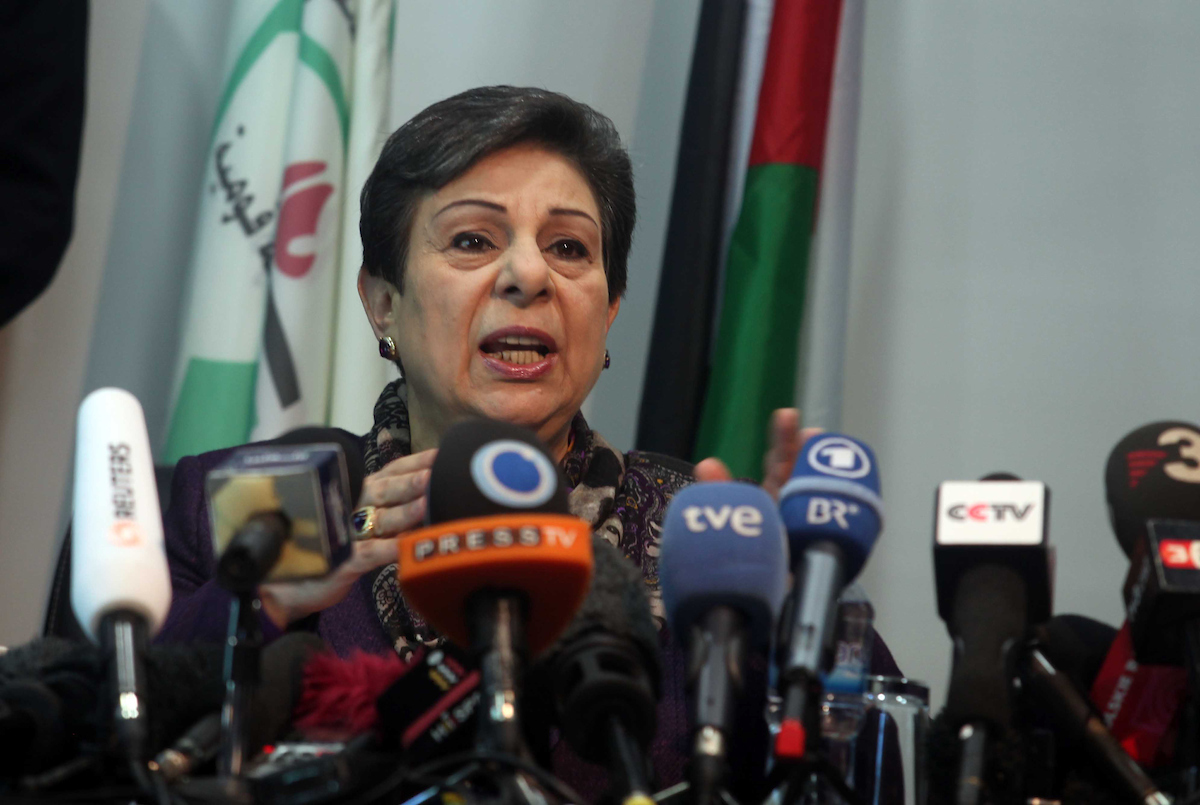Ashrawi urges American Arabs to unify for Palestine
Hanan Ashrawi, a Ramallah-based member of the Palestinian Liberation Organization (PLO) Executive Committee and popular English language voice for the Palestinian cause in the US, urged American Arabs to “mobilize” and set aside their differences to strengthen the voice of the Palestinian diaspora.
During a Zoom discussion Saturday with American Arab leaders, hosted by ArabAmerica.com, Ashrawi said the US Arab community faced many of the same “very difficult conditions and obstacles” that Palestinians face around the world.
But, Ashrawi said, if they could bridge their differences and unite around common principles of justice, they could become an important voice as advocates for the Palestinian cause.
She argued it was especially important as US society becomes more polarized, but argued that Palestinians and Arabs needed to respect each other in order to unify.
“You cannot antagonize others. You can’t intimidate others. You cannot insult others. You have to work with them to find common ground,” Ashrawi urged.
“Even when you challenge. I challenge a lot. I am known to be very blunt. I don’t mince words. But at the same time I don’t insult. I don’t bring other people down. What you need to do is to be able to challenge in a way that shows you respect yourself so that others will respect you. This is extremely difficult.”
Asked about how to bridge the divisions that segment Palestinians in the US and abroad, Ashrawi urged all sides to embrace their differences, saying: “Arabs are not identical and we are not monolithic. We have to celebrate our diversity.
“We are all under attack,” she said. “In the US, you are seeing the rise of identity politics … You cannot be neutral in the face of such racism … and such distortions. You must embrace your Arab identity and be proud of it. What we have to do is to mobilize to make our space in the public discourse.”
Ashrawi criticized the Arab League, calling it “a disaster” in confronting Israel’s atrocities and oppression. She acknowledged Palestinians could do a better job of communicating, but said that they were working under oppressive conditions and without major funding or backing.
“It’s difficult because what we do, we do voluntarily and there is no funding,” Ashrawi said.
“We have a problem, if you want me to be very frank with you. We have a problem with many in the leadership think that they know it all.”
Ashrawi also said that rivalries prevented there from being a clear and powerful strategic message.
“They don’t think anyone else has the ability to present the cause. We don’t have the funds. We don’t have the institutions … we try desperately to face a real assault,” Ashrawi said.
She assed it was important for Palestinians and Arabs in the US to engage in the political system as a unified voice.
“You need to speak out. You need to stand up and speak out. You need to challenge. You need to make the facts known, to get people to unlearn what they have learned because for a long time Israel was dictating the agenda,” she said.
“Work within a group. Work collectively; organize, use the system. Work with other people because it is an intersectional issue. You can work with women. You can work with African Americans. You can work with youth. You can work with indigenous people. You can work with others who feel marginalized, excluded and oppressed. The mentality of oppression is the same everywhere.”
She stressed: “You have natural allies in the state. You have to work together … Within the system you can influence political decisions. Hold your representatives accountable.”
Ashrawi defended the Palestine National Authority, adding they “do not make political decisions” unlike the PLO.
“It is unfair to say failure, failure, failure … they did many things. They built many institutions,” she said.
“You have to place it in context. The Palestinian leadership is working under extremely adverse conditions and circumstances. They have no powers. They have no rights like everyone else. Israel controls everything, the lands, the resources, the water, our lives.”
Ashrawi added that while Palestinians continued to push for action from the International Criminal Court, Israel and the US continued to obstruct that legal process.
“They are punishing the individuals who are in charge of the global judicial and accountability system,” Ashrawi said. “This is unconscionable.”

The many firsts of Hanan Ashrawi, one of Palestine’s most notable politiciansSaudi Arabia says it stands by Palestinians, supports efforts for just solution



